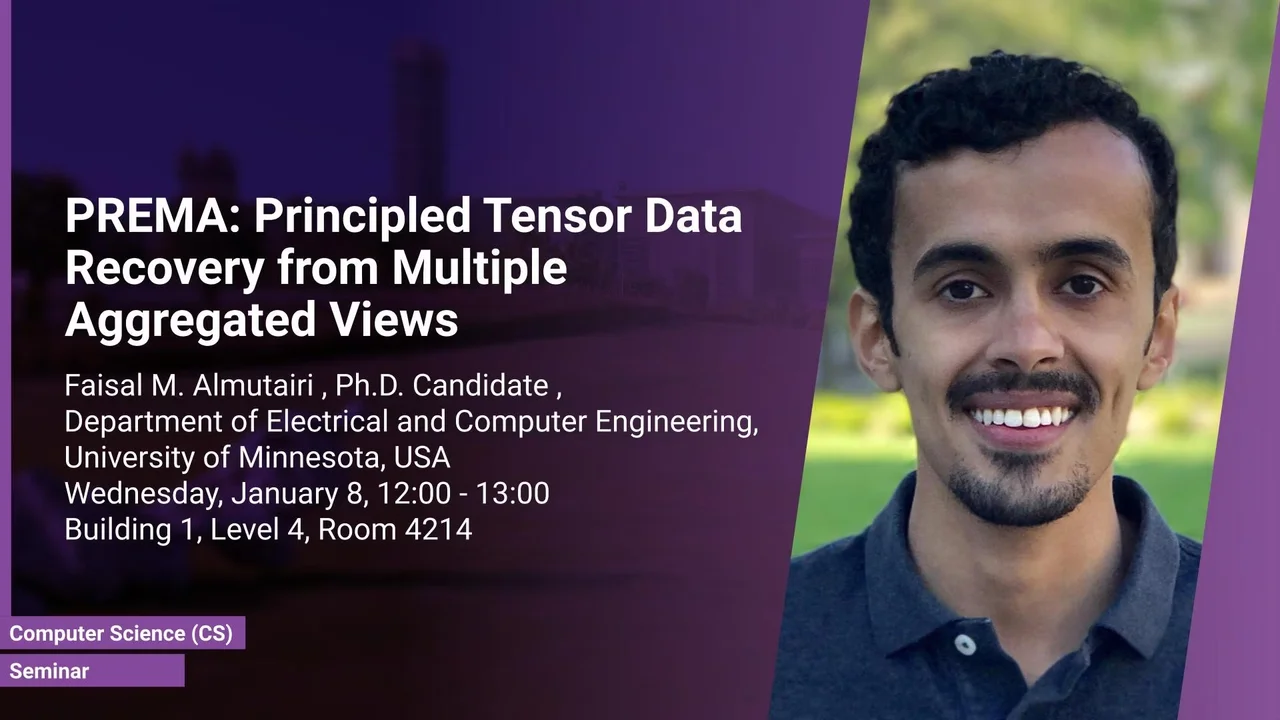
PREMA: Principled Tensor Data Recovery from Multiple Aggregated Views
- Faisal M. Almutairi, Ph.D. Candidate, Electrical and Computer Engineering, University of Minnesota
B1 L4 R4214
The proposed method, called PREMA, leverages low-rank tensor factorization tools to provide recovery guarantees under certain conditions. PREMA is flexible in the sense that it can perform the disaggregation task on data that have missing entries, i.e., partially observed. The proposed method considers challenging scenarios: i) the available views of the data are aggregated in two dimensions, i.e., double aggregation, and ii) the aggregation patterns are unknown. Experiments on real data from different domains, i.e., sales data from retail companies, crime counts, and weather observations, are presented to showcase the effectiveness of PREMA.
Overview
Abstract
Multidimensional data have become ubiquitous and are frequently involved in situations where the information is aggregated over multiple data atoms, thus exhibit low resolution. The aggregation can be over time or other features, such as geographical location or group affiliation. In some cases, we have access to multiple aggregated views of the same data, each aggregated in one or more dimensions, especially when data are collected or measured by different agencies. For instance, item sales can be aggregated temporally, and over groups of stores based on their location or affiliation. Gross economic product data can be reported on a quarterly basis at the state level, and annual basis at the county level. However, data mining and machine learning models require detailed data for personalized analysis and prediction. Thus, data disaggregation algorithms are becoming increasingly important in various domains. The goal of the work in this talk is to reconstruct finer-scale data from multiple coarse views, aggregated over different (subsets of) dimensions. The proposed method, called PREMA, leverages low-rank tensor factorization tools to provide recovery guarantees under certain conditions. PREMA is flexible in the sense that it can perform the disaggregation task on data that have missing entries, i.e., partially observed. The proposed method considers challenging scenarios: i) the available views of the data are aggregated in two dimensions, i.e., double aggregation, and ii) the aggregation patterns are unknown. Experiments on real data from different domains, i.e., sales data from retail companies, crime counts, and weather observations, are presented to showcase the effectiveness of PREMA.
Brief Biography
Faisal M. Almutairi is currently a Ph.D. Candidate in the Department of Electrical and Computer Engineering, University of Minnesota, Minneapolis, MN, USA, and a Visiting Scholar in the Department of Electrical and Computer Engineering, University of Virginia, Charlottesville, VA, USA, under the supervision of Professor Nikolaos D. Sidiropoulos. He received the B.Sc degree with first-class honor in electrical engineering from Qassim University, Qassim, Saudi Arabia (2012), the M.S. degree in electrical engineering from the University of Minnesota (2016), and the M.S. degree in Industrial & Systems Engineering from the University of Minnesota (2017). Faisal served as a Teaching Assistant for multiple theory and laboratory courses at Qassim University (2013). He also interned as a Research Assistant at Huawei, Chicago, IL, USA (2018). Faisal received the Graduate School Scholarship (2014—2019) from Qassim University. He also received the VLDB Travel Grant Award (2018) funded by the National Science Foundation NSF. His research interests include signal processing, optimization, data analytics, and machine learning.